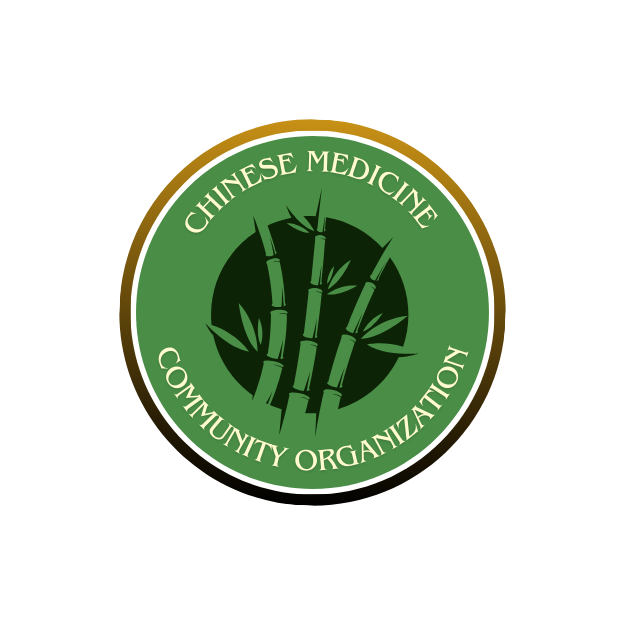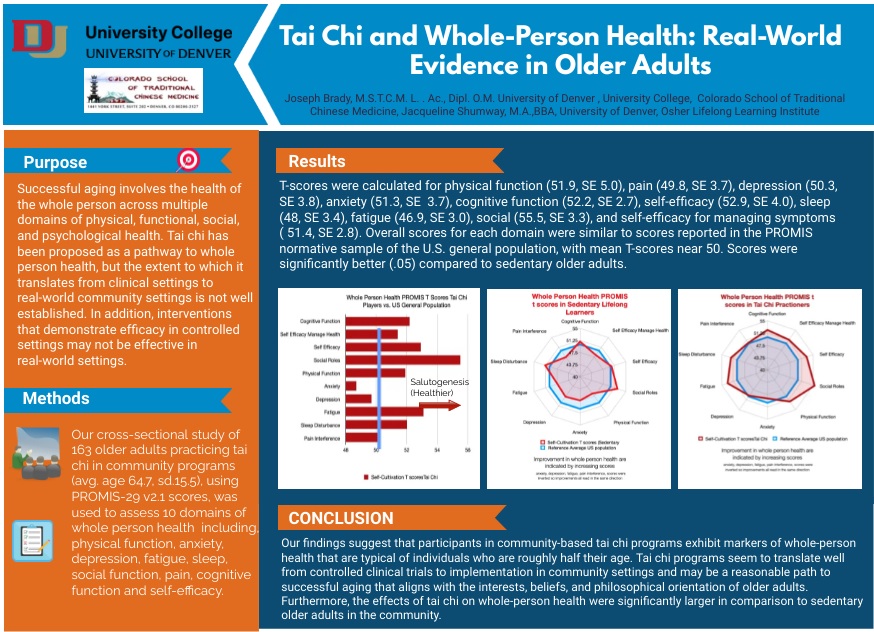By Joe Brady, LAc.
Harvard Medical School and Brigham and Women’s Hospital Osher Center for Integrative Health, Conference Sept. 18-19 2023.

The research department here at CCMU presented it’s first “contribution to science” with the presentation “Tai Chi and Whole-Person Health: Real-World Evidence in Older Adults“ at the inaugural Tai Chi & Qigong as whole Person Health Conference in Boston. The two-day conference served as a profound intersection where Eastern traditions met Western science, showcasing the transformative power of Tai Chi and Qigong in promoting successful aging and whole person health. Distinguished professionals, including esteemed researchers, medical experts, and master practitioners, converged to unravel the dynamic tapestry of ancient practices, scientific innovation, and their synergistic effects.
On Day 1, pivotal discussions and interactive sessions highlighted the multidimensional benefits of Tai Chi and Qigong, emphasizing their pivotal role in enhancing physical, psychological, and social well-being. Attendees dived into the nuanced realms of these practices, exploring their impacts on cognitive function, mental health, and community wellness. The day unveiled the blossoming alliance of traditional wisdom and contemporary research, opening vistas of integrative health.
Day 2 accentuated this narrative, unveiling robust conversations around the scientific exploration of traditional East Asian concepts like Qi. The day was earmarked by enlightening sessions illuminating the role of these practices in chronic disease management, mental health enhancement, and community engagement, particularly among diverse populations. The discussions underscored the pivotal role of standardizing training and credentialing of instructors, ensuring the integrity and efficacy of practice.
Together, these dialogues underscored a “Tao” or pathway to successful aging and whole-person health, portraying Tai Chi and Qigong not just as physical exercises, but holistic experiences that weave through the intricate layers of the human existence — body, mind, and spirit. They highlighted an emergent paradigm where age is not a barrier, but a journey of wisdom, and health is a harmonious dance of well-being.

Tai Chi and Whole-Person Health: Real-World Evidence in Older Adults
Successful aging involves nurturing the health of the whole person, encompassing physical, functional, social, and psychological well-being. Tai Chi, an ancient Chinese martial art and mind-body practice, has gained recognition as a potential pathway to achieving holistic health. A recent study conducted by Joseph Brady, an adjunct professor at the University of Denver, and chair of the research department at the Colorado Chinese Medicine University, and Jacqueline Shumway, of the Osher Institute at DU, and a former faculty member at the Colorado School of Traditional Chinese Medicine, sheds light on the real-world impact of Tai Chi on older adults. Their groundbreaking research has attracted attention and led to an invitation to present their findings at Harvard Medical School’s, Osher Center for Integrative Medicine in September.
While previous randomized control trials had demonstrated the multiple benefits of Tai Chi, concerns persist regarding the translation of these findings to everyday life. Often, interventions that prove effective in controlled environments may not yield the same results in community settings.
To address this gap, Brady and Shumway conducted a cross-sectional study involving 163 older adults who actively practiced Tai Chi within community programs. The participants, with an average age of 64.7 years, were assessed using PROMIS-29 v2.1 scores, which evaluated various domains of whole-person health, including physical function, anxiety, depression, fatigue, sleep, social function, pain, cognitive function, and self-efficacy.
Analyzing the results, the researchers calculated T-scores for each domain. Notably, these scores indicated that older adults engaged in community-based Tai Chi programs exhibited markers of whole-person health that were typical of individuals who were nearly half their age.
The implications of this study are significant suggesting that Tai Chi programs successfully translate from controlled clinical trials to real-world community settings. This finding provides reassurance that Tai Chi may serve as a practical and effective strategy for successful aging, one that resonates with the interests, beliefs, and philosophical orientation of older adults. The study also found significantly larger improvements in whole-person health observed among Tai Chi practitioners compared to sedentary older adults in the community. The results of this research have broad implications for future studies and the integration of Tai Chi into community programs. Further investigation is warranted to explore the long-term effects of Tai Chi, elucidate the underlying mechanisms that contribute to its benefits, and establish guidelines for optimal implementation across diverse community settings. By expanding our understanding of the impact of Tai Chi on whole-person health, we can pave the way for enhanced well-being and successful aging in older adults.
The work of Joseph Brady and Jacqueline Shumway demonstrates the potential of Tai Chi to foster whole-person health in older adults. Their research serves as a stepping stone towards a deeper appreciation and integration of this ancient practice into modern society, promoting a comprehensive approach to aging well.
Key Takeaways
Holistic Health: Tai Chi and Qigong are gaining recognition for their role in promoting holistic health, bridging gaps between physiological, psychological, and emotional wellness.
Virtual Adaptation: The adaptability of Tai Chi to virtual formats has been validated, with positive feedback and increased attendance.
Specialized Applications: The practices are being customized for specific health concerns and populations, showcasing their versatility.
Scientific Backing: Continued research and evolving scientific literature are cementing the role of Tai Chi and Qigong in health and wellness.
Integration of Eastern and Western Concepts: A significant focus on blending traditional Eastern practices like Tai Chi and Qigong with Western medical and psychological insights.
Diversity and Inclusion: Efforts to make Tai Chi and Qigong accessible and beneficial to diverse communities, with a focus on people of color and women.
Research and Development: Ongoing research on the health benefits of Tai Chi and Qigong, including mental health, chronic pain management, and cognitive functions.
Credentialing and Training: Discussions around the need for standardized training and credentialing for instructors to ensure safe and effective practice.
Explorations in Body Intelligence, Examples from Western and East Asian Medicine
This session explored unique boundaries between traditional concepts, such as Qi, and leading-edge modern principles of biophysics and developmental biology. Specific topics will include electromorphogenesis, meridians and acupoints, and the scientific exploration of traditional East Asian medicine concepts such as Qi.
Michael Levin
Michael Levin received his Ph.D. in genetics from Harvard University. He is currently Distinguished Professor and Vannevar Bush Chair in the Biology department at Tufts University, and serves as director of the Tufts Center for Regenerative and Developmental Biology. His work on left-right asymmetric body structures is on Natures list of 100 Milestones of Developmental Biology of the Century. His lab studies unconventional embodiments of mind, using a combination of developmental biophysics, computer science, and cognitive science. Applications of the work on the collective intelligence of body cells range across birth defects, regenerative medicine, cancer, synthetic bioengineering, and artificial intelligence.

